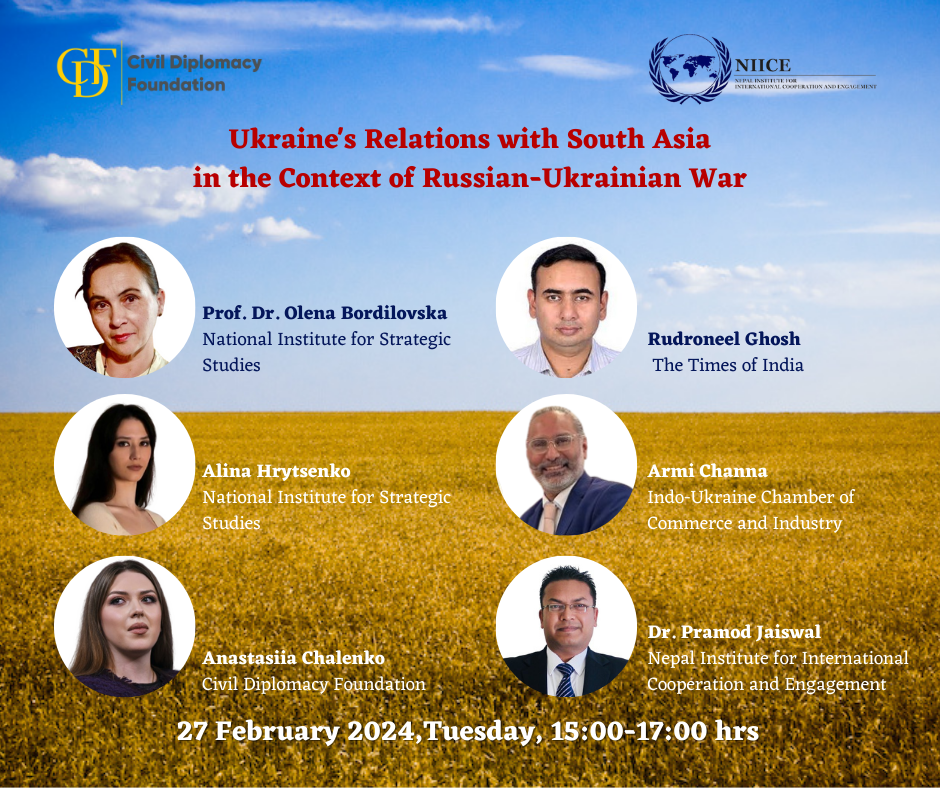
Ukraine’s Relations with South Asia in the Context of Russian-Ukrainian War
Watch it on the NIICE Nepal YouTube channel
The webinar was jointly hosted by the Nepal Institute for International Cooperation and Engagement (NIICE) and the Civil Diplomacy Foundation. The discussion began with Dr Pramod Jaiswal, Research Director of NIICE, who gave a brief overview of the impact of the Ukraine-Russia conflict, highlighting how it has not only affected the South Asian nations in particular but the entire world in general. After that, Ms. Anastasiia Chalenko, on behalf of the Civil Diplomacy Foundation, highlighted the importance of mutual cooperation between Ukraine and South Asian nations. Then, she introduced the experts of the webinar session.
Panelists:
Prof. Dr. Olena Bordilovska - National Institute for Strategic Studies
Mr. Rudroneel Ghosh - The Times of India
Ms. Alina Hrytsenko - National Institute for Strategic Studies
Mr. Armi Channa - Indo-Ukraine Chamber of Commerce and Industry
Geopolitical dynamics
Prof. Dr. Olena Bordilovska (National Institute for Strategic Studies) commenced her discussion with Ukraine’s lost opportunity of having close relations with South Asian nations due to its euro-centric policy before the war. As an expert on the region, Dr Bordilovska emphasized South Asia’s, specifically India's and Sri Lanka’s, neutral stance on the Russia-Ukraine war. While understanding the sensitivity of the issue and its geopolitical impact, she commented how neutrality was a hindrance in the ‘war of justice’.
Furthermore, she laid stress on the Russian propaganda popular among South Asian states and the need to address them, explain Ukraine’s position, and give a true narrative of the situation. Another important growing matter of concern discussed by Dr. Bordilovska was the illegal hiring of South Asian civilians such as Nepalis and Indians to fight in the ongoing war.
South Asia’s position in the war
Mr. Rudroneel Ghosh (The Times of India) talked about the Russia-Ukraine conflict, with regard to the Indian scenario. Taking on from Dr. Bordilovska, Mr. Ghosh deliberated about the reasons for India’s neutral position in which he mentioned three aspects namely strategic policy, legacy issues, and myths. Mr Ghosh went on to say that these aspects pushed India towards Russia.
However, he then explained how India’s relations with Russia are slowly coming undone due to the latter’s close ties with China. Then, he proposed a way forward of boosting close relations between India as well as other South Asian nations and Ukraine by targeting the youth through sports, yoga, and business.
Potential opportunities for cooperation- Ms Alina Hrytsenko (National Institute for Strategic Studies) highlighted Ukraine’s policy for the South Asian region. She called attention to Ukraine’s multifaceted approach to South Asia which included a distinctive approach for stronger, nuclear nations of India and Pakistan and a different one for smaller nations. She laid prominent significance on the value of small countries.
Then, she underlined the potential of agriculture in the economic field of cooperation between Ukraine and small countries of the Global South by taking the example of Nepal. Ms. Hrytsenko then explained the Peace Formula, including its three principles - national security, food security, and ecological system.
Business prospects for collaboration- Mr. Armi Channa (Indo-Ukraine Chamber of Commerce and Industry) brought forward the pre-war and post-war trade scenario in Ukraine. He substantiated the various sectors and industries including the defence industry which could benefit the Indian farm market. With regard to tourism. Mr Channa emphasised the Indian film industry and its potential role in bringing Ukraine to the forefront as a tourist destination in India. Moreover, he informed about the Memorandums of Undertaking with City Councils in Ukraine on multiple projects mostly green and wind energy, waste management, agro-business, construction, and reconstruction.
The webinar concluded on a note of the importance of building resilient ties between Ukraine and South Asian countries. Participants expressed gratitude for the informative session. Overall, the webinar provided valuable insights into Ukraine's relations with South Asian countries amidst the ongoing Russian-Ukrainian war, underscoring the significance of diplomatic engagement and regional cooperation in times of geopolitical upheaval.
This event report was prepared by Harshita Prashar, NIICE Intern

Recent Comments